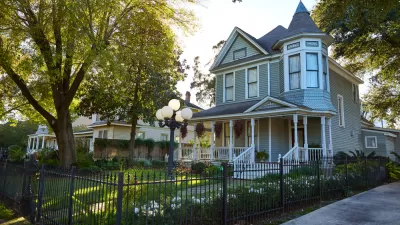For other cities struggling with sky-high real estate prices, Colorado’s resort town offers some instructive lessons on what’s working — and what isn’t.

The first time Jenny Stuber ever visited Aspen, it was on rock legend John Denver’s private jet, called the “Windstar.” She had been living with her mother, on welfare and eligible for free-and-reduced lunch at school. But when her father moved to Aspen in 1976, she began to visit him in the summers. Aspen introduced her to a new world — one of extreme contradictions. Whereas many locals, like her father, were able to get by on middle-class salaries and lived in affordable homes, others spent $2 million on second, third, or even fourth homes. This experience, in part, inspired her to become a sociologist, and to turn her lens on questions of social class and how it’s formed.
In her new book, “Aspen and the American Dream: How One Town Manages Inequality in the Era of Supergentrification,” Stuber, an associate professor of sociology at the University of North Florida, explores how the Aspen of her childhood has shifted in an era of “supergentrification.” While the city has managed to maintain a working middle class, thanks in large part to an affordable housing program established in the 1970s, progressive political leadership and creative urban planning, moneyed interests threaten to tip the scales in favor of high-end development. In 2016, the City Council announced a complete moratorium on development. Over 10 months, it rewrote the land-use code to favor residents over developers.
Stuber spoke with Next City about her book, what supergentrification looks like on the ground, and what other cities and communities can learn from places like Aspen. This interview has been lightly edited.
FULL STORY: Can Cities Be Saved From ‘Supergentrification’? Aspen May Offer a Roadmap

Alabama: Trump Terminates Settlements for Black Communities Harmed By Raw Sewage
Trump deemed the landmark civil rights agreement “illegal DEI and environmental justice policy.”

Study: Maui’s Plan to Convert Vacation Rentals to Long-Term Housing Could Cause Nearly $1 Billion Economic Loss
The plan would reduce visitor accommodation by 25% resulting in 1,900 jobs lost.

Planetizen Federal Action Tracker
A weekly monitor of how Trump’s orders and actions are impacting planners and planning in America.

Wind Energy on the Rise Despite Federal Policy Reversal
The Trump administration is revoking federal support for renewable energy, but demand for new projects continues unabated.

Passengers Flock to Caltrain After Electrification
The new electric trains are running faster and more reliably, leading to strong ridership growth on the Bay Area rail system.

Texas Churches Rally Behind ‘Yes in God’s Back Yard’ Legislation
Religious leaders want the state to reduce zoning regulations to streamline leasing church-owned land to housing developers.
Urban Design for Planners 1: Software Tools
This six-course series explores essential urban design concepts using open source software and equips planners with the tools they need to participate fully in the urban design process.
Planning for Universal Design
Learn the tools for implementing Universal Design in planning regulations.
Caltrans
Smith Gee Studio
Institute for Housing and Urban Development Studies (IHS)
City of Grandview
Harvard GSD Executive Education
Toledo-Lucas County Plan Commissions
Salt Lake City
NYU Wagner Graduate School of Public Service





























